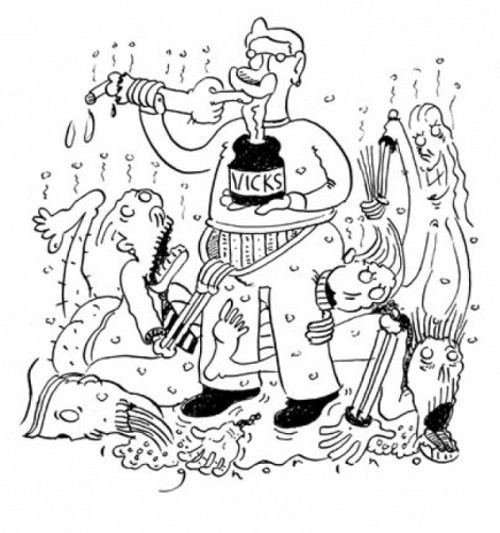Zombies have so many disturbing traits, but my question involves only two: the stench of their decomposition, and their tendency to congregate in large numbers. A single dead body gives off a foul odor that is almost overpowering and certainly enough to make a normal person vomit if they were close enough. Now, say you’re one of those zombie-apocalypse survivors, barricading yourself inside a shopping mall, faced with dozens, if not hundreds, of undead shoppers. Putting aside the brain eating and all that, how dangerous is the combined smell of all those ambulatory corpses? I assume they’re giving off methane or ammonia or some other noxious gas. Would the aggregate stench of hundreds of walking dead make your mall sanctuary uninhabitable, even if you managed to keep from being bitten? —Alex, White Post, Virginia
Mark Twain would have said yes.
Shopping-mall zombies don’t figure much in the Twainian oeuvre. However, a distantly comparable scenario may be found at the end of A Connecticut Yankee in King Arthur’s Court (1889), in which the protagonist, Hank, and a small group of associates use dynamite, electrocution, drowning and Gatling guns to slaughter the massed chivalry of England—30,000 knights. Surrounded by corpses, the victors soon realize they have no reason to celebrate: “We were in a trap … of our own making. If we stayed where we were, our dead would kill us … [we would be] made sick by the poisonous air bred by those dead thousands.” Hank’s nemesis, the wizard Merlin, shows up to gloat: “Ye were conquerors; ye are conquered!” He then blunders into a live wire and is killed.
Riveting stuff, and more so because it was accomplished without computerized special effects. But it’s also double fiction, in terms not just of the story, but the idea, that cadavers emit toxic fumes. Decaying bodies are definitely stinky, but the toxic part is a myth.
Belief in miasma, as the alleged emanations of the dead were known, dates back to the ancient Greeks. The 1797 edition of the Encyclopedia Britannica soberly reported that the “putrid effluvia of dead bodies” was responsible for illness and death in the same way that marsh gas was. One man was reported to have suffered a “violent inflammation” of the throat after merely leaning over a rotting body. Today, nobody talks about miasma, but the underlying fear persists, surfacing frequently after natural disasters, when the authorities hastily bury the dead in mass graves to prevent the spread of disease.
Such measures are pointless. However funky their smell, dead bodies aren’t especially dangerous, setting aside those that are trying to eat your brain. Precautions may be in order when the cause of death is an infectious disease. (Tuberculosis is said to be especially problematic.) But for the most part, toxic pathogens are waterborne, not airborne. True, some germs can be spread by aerosol droplets, but these are exhaled only by the living. The dead have stopped breathing, and one assumes the undead have, too.
A dead body gives off a variety of gases as it decays. Two of them, aptly named cadaverine and putrescine, are primarily responsible for “dead-body smell” and are produced mainly during the bloat and putrefaction phase of decomposition. The two chemicals are toxic, but only in large amounts; a 200-pound individual could ingest more than a quarter pound of either without getting a lethal dose.
Other gases given off by decaying bodies, such as carbon dioxide, methane and hydrogen sulfide, can also be dangerous, particularly if encountered in a confined space. The first two can suffocate you, and the third is poisonous—every so often you hear of sewer workers being killed by a buildup of hydrogen sulfide in the pipes. Conceivably, therefore, if you were locked up for an extended period with a roomful of rotting zombies, the fumes might accumulate to a perilous degree. I will say personally, however, that if I were in that situation, the danger of hydrogen sulfide poisoning would not be uppermost in my mind.
Still, while the stench of zombies probably won’t kill you, it may gross you out of existence. If you’re somewhere that makes you constantly want to throw up, that, to me, is a good working definition of an uninhabitable environment.
A couple caveats, though. First, we’re assuming zombies are in an active state of decomposition, which is the time of peak reek. We don’t know for certain that’s the case, and since zombies are imaginary, we won’t soon find out. Second, as medical students know, you can get used to just about anything. A dab of Vicks VapoRub under the nostrils may disguise the scent of zombies, if there is one. Or you could just be a man and suck it up.
Send questions to Cecil via StraightDope.com or write him c/o Chicago Reader, 11 E. Illinois, Chicago 60611. Subscribe to the Straight Dope podcast at the iTunes Store.
More by Cecil Adams
-
This Is the End, My Friend
This week's Straight Dope marks the last appearance of the column as the Teeming Millions have known it for the past 45 years.
- Jul 11, 2018
-
Do Brain Supplements Do Anything?
Brain Drain
- Jul 4, 2018
-
Is flying really worse for the environment than driving?
Planes and Trains
- Jun 27, 2018
- More »




